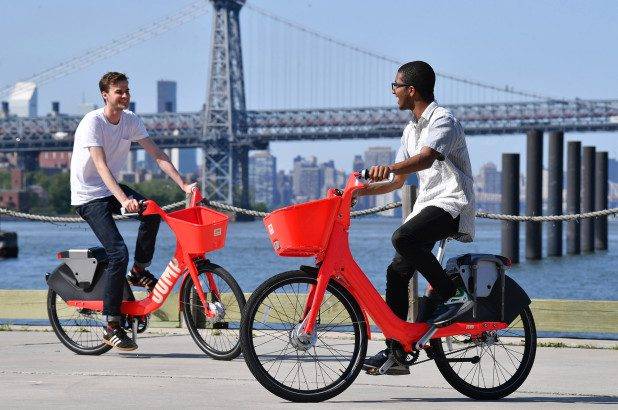African Bike-Hailing Market Get Ready, Self-Driven Bikes And Scooters Are On Their Way

It won’t be long now before you can leave your bike by the pole of a street light and enter a coffee shop, knowing that the low-battery two-wheeler would by itself find the nearest juice box and fill up itself in readiness for another use.
It may not be long too before electric bikes stop to lay around helplessly in cities, because Uber is making autonomous bikes and scooters happen.
Exciting announcement from @UberATG at today's @DIYRobocars event. "Micromobility" = autononomous scooters & bikes that can drive themselves to charging or better locations. Hiring now pic.twitter.com/sOjroo8XZI
— Chris Anderson (@chr1sa) January 20, 2019
The ridesharing company looks to hire people that will help develop autonomous scooter and bike technology. The catch is to build bikes that would be able to self-drive themselves to charging or better locations.
The best way to get around your city. pic.twitter.com/1SdY3UwUCZ
— JUMP (@jump_rides) December 30, 2018
Last year, Uber acquired the bike-and-scooter-sharing startup Jump and has since then not fallen short of offering electric bikes and scooters under the New York-based dockless e-bike brand. The deal which was reported to have involved USD 200 Mn, didn’t come with much surprise, as both parties had already been collaborating on projects before then.
The effort to make self-driven bikes and scooters will be made under the same brand, while Uber works on a separate car project called the Uber Advanced Technology Group.
![]()
A major logistical challenge facing electric bike-sharing companies is how to keep the batteries of these gizmos charged.
A league of strategies has been employed to curb this problem, some of which involves employees driving around the city picking up bikes and getting them back to the charging stations.
Bird, a competitor of Jump, has experimented with paying people to collect scooters and charging them at home. The Atlantic’s Taylor Lorenz described how people signed up with the company to drive around their environments, picking up scooter in trucks to bring them back to their charging facility so they could get some juice.
While Jump announced last month that they were developing a new electric bike design, self-driven bikes and scooters are still obviously better than battery swaps. It will be more convenient for both the company and the users, and also potentially improve vehicle utilization.
Given the nuisance constituted by run-down electric bikes just lying around in cities, being able to find their way to a circuitry should do a solid for metropolis organization.
Over the course of the day or week, traffic patterns can culminate in an array of bikes in some areas and just a handful in others. Given that some bike-sharing companies send out van fleets to evenly spread their products, autonomous bikes could do this in a more efficient way without human assistance.
And Africa?
Electric cars and bikes are yet to gain their footing in Africa. Due to challenges with grid electricity and the yet developing off-grid, the continent has to rely on the abuzz e-bike market. The likes of Go Kada in Nigeria, Boda Boda in East Africa and other such as Awabike, are keeping the continent’s ridesharing market abuzz while Uber, Taxify and (more recently) Mr. Taxi are doing their bits in cab-hailing.
Uber has recorded significant traction in Africa, but should the electrical self-drive products launch into the continent, the present state of the economy may not support e-bikes and the lot. Electric cars have not been widely adopted due to electricity constraints, and Uber may have to wait another decade for the recent grid and off-grid investments to fully impact the continent’s urbanities.
Sub-Saharan African countries have been reported by the IMF to be among the world’s fastest-growing economies, which marks that sooner than thought, the continent would be ready to receive even the long-awaited flying cars.
With the announcement from Uber’s stables, African investors and entrepreneurs would no doubt pick an insight or two about how to successfully replicate the self-drive technology in the continent.
Feature Image Courtesy: Jump